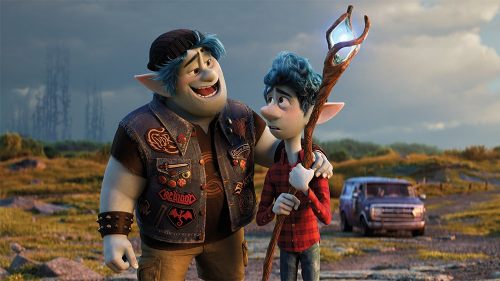Lightning McQueen Gets Woke In The Surprisingly Touching CARS 3
The grand thematic conceit of Disney and Pixar’s Cars 3 is that its folksy protagonist, the cherry red racer Lightning McQueen (Owen Wilson) is past his prime and better off focusing his energy on being a product pitchman — lending his likeness to a variety of disposable, branded products in order to make the wealthy entrepreneur and new owner of Rust-eze Medicated Bumper Ointment, Sterling (Nathan Fillion) even richer. If only he knew that his real-life fate isn’t all that different.
Cars has never been Pixar’s most beloved franchise, though it’s certainly one of its most lucrative. Department stores across the United States are littered with merchandise based on the film series. Around the release of Cars 2 in 2011, it was revealed that retail sales for Cars-branded goods reached an astounding $10 billion. There’s an adoring, engaged fanbase for these movies, even if they don’t excite the hypothetical monocle-wearing adult critic who thinks it's all a bit of dull spectacle signifying nothing.
It doesn’t help that the vast majority of Pixar films possess some relationship to a version of reality, but Cars does not. Typically, either the magical world exists along side our own, ala Monsters Inc. or inanimate objects, non-speaking animals, or intangible emotions have adventures unseen to the human eye, like in Toy Story, Finding Nemo, or Inside/Out. Cars is something else entirely, a world where automobiles behave like people, have feelings, grow old, work nine-to-five jobs, and die. No one knows who builds the cars or if they might even possibly reproduce on their own.
The movies don’t care, they don’t discuss these ideas, and quite frankly, it would be a bit odd if they did. But, it does have the unintended effect of distancing the audience. This is a world where cars watch other cars race. It’s a world where there are only cars. Move along. Nothing to see here. That missing bit of world-building, which seems quaint in an era when audiences demand laborious backstories for everything, allows people to develop wild theories, like the one about the Cars films being post-apocalyptic nightmare hellscapes populated by talking machines. Pixar films excel when they reveal something about human nature, and often, the Cars movies miss that mark.
Cars 3 goes a long way toward correcting that deficiency in the franchise, offering a story about aging gracefully and finding the joy in imparting wisdom onto the next generation. It’s even kinda woke, if you can believe that. Old timey cars talk about racial prejudice and sexism in a particularly weird sequence at a crucial point in the film. McQueen’s character arc is paralleled by that of Cruz Ramirez (Cristela Alonzo) a racing trainer who has secretly longed to get onto the track herself, but never felt she belonged. The film never quite pinpoints why she feels so marginalized, but if one wants to extrapolate on the evidence supplied, one could assume a variety of things — that she’s a female, that she’s Latina, that she’s lower class. Of course, that would require the theorist to apply racial characteristics to a talking car or to attempt to understand the class dynamics of such a world. Again, the movie does not dwell on these questions, which might actually make it a more potent morality play for the actual target audience for Cars. You know, kids.
Still, this is a movie about aging — a topic most children can’t even begin to grasp yet. Lightning and the rest of the racing world is floored by the slick, next-gen racer Jackson Storm (played with arch smugness by Armie Hammer). The advanced training and ruthless, analytical methodology Storm uses to crush his competition runs counter to Lightning’s aw-shucks enthusiasm and belief in “getting your tires dirty” and other blue collar ethics. Passing those sorts of aphorisms to the young becomes the crux of the story and is what offers Lightning his ultimate redemption. In those moments, Cars 3 speaks to the skeptical adult in the audience and offers him or her something recognizable and relatable to consider.
In that way, Cars 3 is the first of these films to not feel like a commercial for a t-shirt or an amusement park ride. Its empowerment theme might not be as forceful or zeitgeisty as the one found in Wonder Woman, but it gets points for making an effort. If these movies really do exist in a future where human beings have left the planet for good, then it’s worth it to know that the automobiles that have inherited the earth have the same problems we do, and are still doing their best to overcome them.



